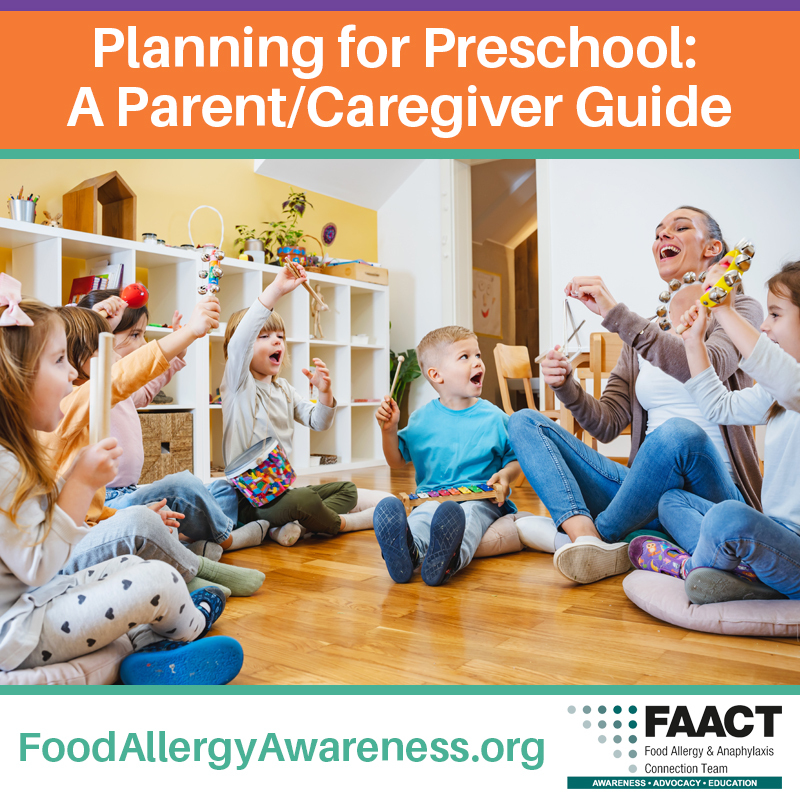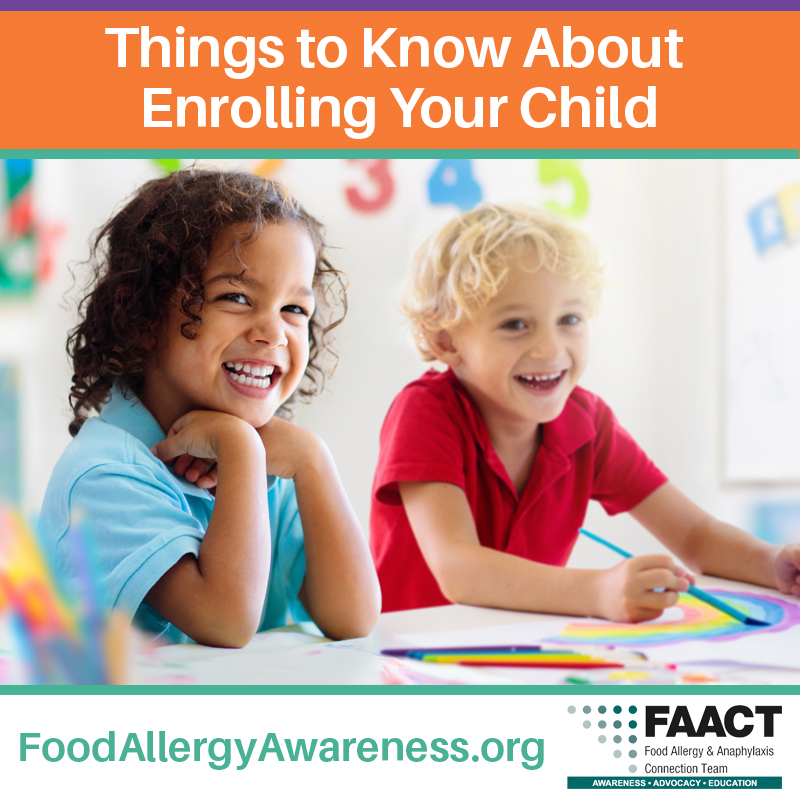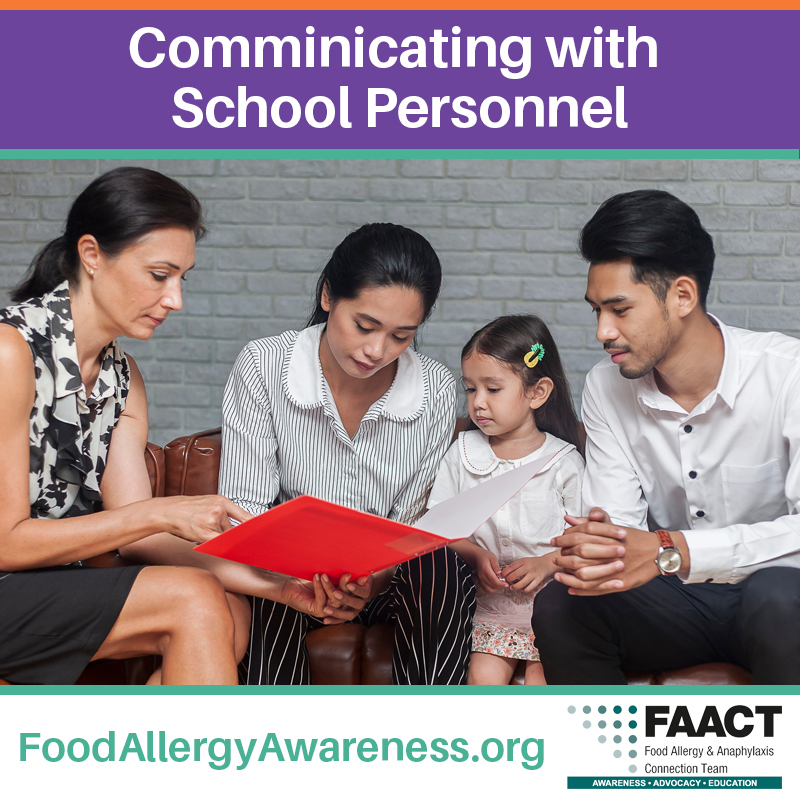Preschool
Subcategories

Planning for Preschool: A Parent’s Guide
Preparing your child for preschool should be a rewarding and exciting time. However, families of children who have food allergies often find this time stressful. With proper planning, education, and a supportive team, the risk for students at this age can be reduced.
Download FAACT's 'Planning for School: A Parent/Caregiver Guide'.
Download FAACT's 'Communicating with School Personnel: Parent/Caregiver Checklist'.

Preparation
Preparation should begin well in advance of the child entering a daycare center, or preschool, and parents should do their homework, when looking into both private, and public schools.
- Research several preschools for food allergy management policies or guidelines. Compare these policies and/or guidelines with other guidelines, such as the CDC’s Voluntary Guidelines for Managing Food Allergy found in the Education Resource Center.
- Research the preschool’s environment:
- Visit the preschool’s website
- Talk to your neighbors
- Go to community functions and ask other parents their input
- Participate in any “open house” events
- Schedule a tour of the school
- When visiting centers or schools, be sure to ask questions and keep notes to compare with other schools.
- Parents may refer their child to be evaluated for a [Section 504 plan]* or [Individual Education Plan (IEP)]. For instructions on how to refer your child for a Section 504 Plan or an IEP, visit the [Civil Rights Advocacy] page.
- Call the preschool to set up a meeting. Ideally, if your child is entering the preschool age, contacting the preschool at least 1-2 years prior, as there is possibly a wait list.
- Does the school participate in a federally funded program?
- In choosing a preschool capable of accommodating your child’s needs, look for knowledge and practices among caregivers that includes1:
- A general awareness of food allergies
- Constant diligence in the management of food-allergic students
- Careful label reading habits
- Avoidance measures of offending foods, arts and crafts containing allergens, etc.
- Procedures for preventing of cross-contact
- A protocol for enacting emergency procedures
- Confidence in administering epinephrine appropriately
- Previous and ongoing training on food allergy management for caregivers

Discussion Topics
In addition to the discussion topics found in “Planning for School: A Parent/Caregiver Guide”, discussion topics and other considerations in choosing a preschool or daycare should include:
-
Training: What type of food allergy training is provided to staff, and how often? Is there a school or RN on site? Who delivers the training? Are staff trained on recognizing the signs and symptoms of an allergic reaction and how to administer epinephrine?
-
Medications: Where are emergency medications stored? Who will be administering medications? How are medications transported throughout the day (to the playground, lunchroom, etc.)? Do children self-carry their medications?
-
Shared space: Private schools sometimes share space with a church. In this case, be sure to ask about activities that may take place when school is not in, and what measures are taken to ensure a safe and clean environment for when the child returns.
-
Meal Plans: Some private schools require student’s to eat from a meal plan provided by the school. Are there exceptions for food allergic students? Can a meeting be arranged between parents and any meal service providers/catering companies to discuss the needs of food allergic students?
-
Safe snacks: Where will “safe snacks” for food allergic students be stored? Is there a “no-nut” policy in place; and if so, how is it enforced? Is there a notification process for food being brought into the classroom?
-
Special Events: How are class parties and special events handled? Are any PTA/PTO members trained on food allergies? How are field trips handled for food allergic students? How does the school work with non-food allergic parents to ensure a safe classroom/environment for food allergic students (letters, presentations, email blasts, etc.)?
-
Cleaning Methods: Children this age tend to constantly place their hands in their mouth, and some children will chew on toys or bed-rails. How often are toys and surfaces cleaned, and by what method? Is there a hand-washing procedure upon arrival to school and after meal/snack times?
-
Food Storage: Is there an area where bottles (non-milk) and food (allergy-friendly) will be stored, to avoid confusion among caregivers during hectic feeding times?
- Food Sharing: What are the centers policies on food sharing? Seat placement during meal and snack times? Will there be designated staff member overseeing food allergic students?
Enrolling Your Child
Provide the preschool with the appropriate paperwork and other items required in a timely manner, replacing as needed throughout the school year.
- Allergy and Anaphylaxis Emergency Plan, signed by your child’s physician
- Two (2), non-expired, epinephrine products
- Additional medications as required (antihistamines, inhalers, etc.)
- Emergency contact numbers
- Avoidance instructions for your child’s allergens i.e. “How to Read a Label”, etc.
- Safe snacks, etc.
Review our detailed parent’s guide to discuss with caregivers: Planning for School: A Parent/Caregiver Guide.
Resources
You can also visit our Education Resource Center to access other free downloads, resources and tools, to assist you in finding the right preschool for your child, including FAACT's 'Planning for School: A Parent/Caregiver Guide' poster.
1 Pediatrics. 2012 Jul;130(1):e25-32. doi: 10.1542/peds.2011-1762. Epub 2012 Jun 25.
Allergic reactions to foods in preschool-aged children in a prospective observational food allergy study., Fleischer DM, Perry TT, Atkins D, Wood RA, Burks AW, Jones SM, Henning AK, Stablein D, Sampson HA, Sicherer SH.

